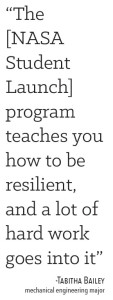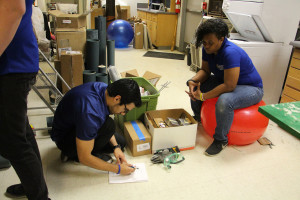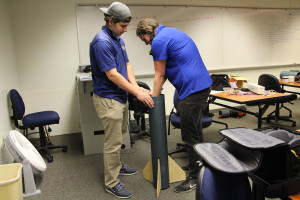Spacing Out: Featuring the Rocket Owls

Being a fulltime college student is stressful as it is, but imagine the tremendous pressure that the small team of four, known as the Citrus College Rocket Owls, have on their shoulders from being involved in the National Aeronautics and Space Administration’s Student Launch Program.
The Rocket Owls are in final preparations for lift off in Huntsville, Alabama on April 16. The group is currently working on project Athena, and show their dedication by working and studying their craft by putting in long hours in the lab.
The program challenges schools from across the country such as Cal Poly, Aburn University, Iowa State and North Western University to design, build, and launch a reusable rocket, all while NASA may improve already existing procedures to retrieve samples of soils and rocks.
“Our goal for this next launch is to make a successful departure, and that everything works sufficiently and correctly,” said Justin Frias, 22, computer engineering major.

The Rocket Owls spend the majority of their free time working long hours on their rocket, dubbed the “Lazarus Rocket,” all while managing to keep up on all their other school work from different classes.
The rocket was originally named the “Frankenstein rocket,” because it had been made from recycled parts of old rockets from their test launches. But at one of their competitions they had misplaced it, then about three days later the team’s mentor Rick Maschek surprisingly found it and it reminded the team of the film “The Lazarus Effect,” so they thought it would make perfect sense to rename it the “Lazarus rocket.”
It is very challenging being in charge of constructing a rocket by yourself but on top of all the other classes and work they have to do, they find themselves struggling to keep up and stay on track with their other classes. The team is very disciplined and dedicated to their work, barely having any free time to relax. “It is all worth it knowing that you are going to get something out of it, so we have to treat it like a job and try to do the best that we can,” said Rocket Owls team leader Rebecca Thomas.
Thomas has high hopes for their next competition. The group competes against over 30 different universities in the nation, and Citrus College is the only community college set to compete against the top universities in the country.
All of the students have improved in their knowledge overtime, while being in this program by learning all the different techniques, and getting comfortable with using the equipment. They are constantly trying to better and improve their work by many trial and error tests as well as a lot of background work followed by many calculations.
“The program teaches you how to be resilient, and a lot of hard work goes into it,” said Tabitha Bailey, 21, mechanical engineering major.
Dr. Lucia Riderer, advisor of the group, said that the students have come a very long way spending many hours together working, sharing that “they didn’t know much” about rocket design and the physics behind launching rockets when they first began.
To Riderer, the NASA Student Launch Program is a very competitive contest that is designed for students who are willing to dedicate most of their time working and improving their technical skills.
“It is rewarding to see everything that they learned, we have a good name at NASA, and I am confident that they will do well,” Riderer said.
The team spends most their time in the lab trying to better their skills by using many calculation methods and a lot of trial and error tests.

Justin Frias and Tabitha Bailey sketching out ideas in the Rocket Owls workspace.
On average they are working and studying from 10 a.m. until 7 p.m., Monday through Friday.
“We usually don’t mind staying for long hours, it’s only bad when the air conditioning machine doesn’t work but we have a coffee machine that keeps us going so that helps whenever we are lacking some sleep,” Thomas said.
The majority of the students are fulltime students but they either have to choose between spending more time on the rocket or their other school work, so some of their other school work does get neglected at times especially when the team is on a deadline or have an upcoming competition.
The team has to make many sacrifices, often giving up some of their social life for this project, but still find time to relax and have some kind of normal college experience.
“We enjoy going out together for dinner or to just hangout after a successful launch to celebrate,” Frias said.
Thomas also enjoys spending time with her family when she does have free time, as well as catching up on her favorite show, “Star Trek.”
“I enjoy the fact that the older series usually have a better dialogue and a better story line. I also like watching the Lord of the Rings movies because I love how the directors are able to create a whole new world with different types of characters it isn’t just like any other typical series of movies,” Thomas said.
It is very rare that the Owls get to see their friends or families whenever they are preparing for their competitions. For the most part all of their parents and friends are supportive of them and the program and they are proud of all of the team’s accomplishments.

Logan Tomes and Rebecca Thomas work on the “Lazarus rocket.”
Although some of their family members especially their mothers are concerned about how many hours they do put into the program. “My parents are very supportive most of the time but they are just mad about the fact that I’m neglecting the house chores,” said Logan Tomes, 21, aerospace engineering major.
Like all college students, Netflix plays a key role in the Rocket Owls’ down time as well.
The Rocket Owls are proud of all of their accomplishments and don’t mind working hard together, they enjoy each others company.
They are very excited to see the competition in Alabama and hope to come back with a victorious win.
Although the team will not have an actual spring break because the competition they are thrilled to have a small break after Alabama.



